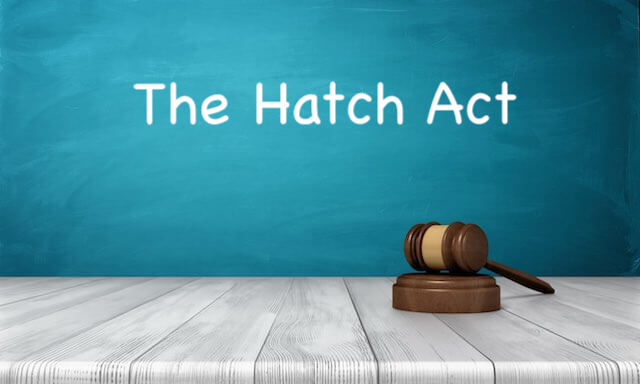In November 2024, American voters will determine who will serve as president of the United States and elect numerous Members of Congress. We can count on forthcoming allegations of Hatch Act violations and at least some federal employees facing removal or administrative disciplinary action for participating in illegal political activity. That is not a wild conspiracy theory; it happens every four years.
Hatch Act Violations and Allegations of Violations are Already Occurring
As luck would have it, allegations of Hatch Act violations are already making national news.
Earlier this year, the US Attorney from Massachusetts resigned after the Office of Special Counsel characterized the Hatch Act violations as “one of the most egregious Hatch Act violations that OSC has investigated.” One might assume a US Attorney would be familiar with the Hatch Act but, perhaps, was not concerned about blatantly violating a law. No doubt, political passions can corrupt our political culture and lead to illegal activity.
In another case, the White House Press Secretary, Karine Jean-Pierre, failed to comply with the Hatch Act after she was warned against using “MAGA” to describe certain Republicans.
Senator Marco Rubio Seeking Names of Federal Employees Undercutting U.S. Foreign Policy
Most recently, Senator Marco Rubio has sent letters to the U.S. Office of Special Counsel and U.S. Inspectors Generals to hold Biden Administration staff accountable for supporting pro-Hamas policies, which undercuts the President’s support for Israel, and potentially violates the Hatch Act.
According to Senator Rubio:
More than 500 Biden Administration employees have reportedly signed an open letter urging the president to call for a ceasefire between Israel and Hamas. These employees may be using their roles in the federal government to undercut efforts aimed at supporting Israel. Further, the employees may have potentially violated the Hatch Act, which prohibits federal employees from participating in partisan political activities at work.
Senator Rubio wants to identify federal employees who have signed this letter and the extent they used their roles as federal employees to work against policies that support the State of Israel.
In a press release, he stated:
Because the letter claims to have been signed by employees across 40 different government agencies and by political appointees confirmed by the U.S. Senate, there is ample opportunity for the signers to abuse their positions to carry out their self-declared goal. These range from officials at the U.S. Department of State insisting on prolonging the review periods of arms sales to Israel to supervisors denying promotion and salary increases to employees that support Israel. Therefore, I urge you to conduct a full investigation to determine which employees signed the letter, publicize their names, and assess to what extent they have used their positions to work counter to the policies of the President.
Senator Rubio’s letter was sent on November 28th. Coincidentally or not, the Office of Special Counsel issued a press release on November 29th. The press release is labeled “The Hatch Act and Federal Employees’ Discussions About the Conflict Between Israel and Hamas.”
It states that “The questions that OSC has received relate to speech expressing support for, or opposition to, individuals and entities involved in the ongoing conflict between Israel and Hamas.”
OSC then adds:
…[I]t is not political activity under the Hatch Act for federal employees to express support for, or opposition to, the issues underlying the conflict or a ceasefire or humanitarian pause. It is similarly not political activity to express support for, or opposition to, foreign political parties or candidates in foreign elections. However, if any such expressions also include statements of support for, or opposition to, domestic political parties, partisan political groups, or candidates for partisan political office, then those expressions are political activity for purposes of the Hatch Act.
This probably does not answer the question of whether some of these employees have violated the Hatch Act. The Senator’s letter states:
“…[I]t is reasonable to suspect that these government employees could have coordinated the letter with partisan political actors and/or groups, such as the DNC, while on government time, using government resources. If this suspicion were to be true, it would constitute major violation of the Hatch Act….”
To determine whether employees were using their official positions or government resources in “supporting pro-Hamas policies, which undercuts the President’s support for Israel, and potentially violating the Hatch Act” will probably require a detailed investigation into the activities of these federal employees. The Office of Special Counsel would then determine whether the Hatch Act was violated.
What Does the Hatch Act Do?
The Hatch Act limits the political activity of federal employees and some state, District of Columbia, and local government employees who work in connection with federally funded programs.
The law aims to ensure federal programs are administered nonpartisan, protect federal employees from political coercion in the workplace, and ensure federal employees are promoted based on merit instead of political affiliation or allegiance to a candidate or political party.
Enthusiasm for a candidate or an issue will overcome individuals who never saw, never read about, or do not remember the periodic announcements issued regarding the Hatch Act and the impact it can have on a federal employee.
The most critical portions of the law are found in 5 U.S. Code § 7323 and § 7324. The Hatch Act means that a federal employee may not “use his official authority or influence to interfere with or affect the result of an election.”
The Hatch Act is often enforced against career federal employees but no often against senior political appointees.
One may wonder why federal employees, who are routinely advised about the Hatch Act and how it may damage a federal career, still take actions that can lead to being subjected to serious disciplinary action or fired instead of just resigning and then actively participating in political activity.
Of course, in some cases, a person knew about the restrictions on political activity but ignored the potential consequences. Here are a few notable examples that have been reported in recent years:
- posting their political beliefs while on duty,
- announcing a fundraiser for a candidate while on duty,
- telling a political “joke” while on duty,
- delivering a political chant to members of the public,
- running for public office and using the agency logo in campaign literature or
- advocating the “Obama Shuffle” (among other activities).
We do not know whether the Office of Special Counsel will open an investigation as requested by Senator Rubio. If that does happen, it will be well publicized as partisan political activity will reach new heights in the upcoming months.
Most federal employees would be well advised to consider their actions on political issues if they want to avoid harming a federal career. It is easy to fall into the trap of assuming “any reasonable person will agree with me on this issue” or “everyone I know has the same views as I do” and then engaging in activity that violates the Hatch Act.





